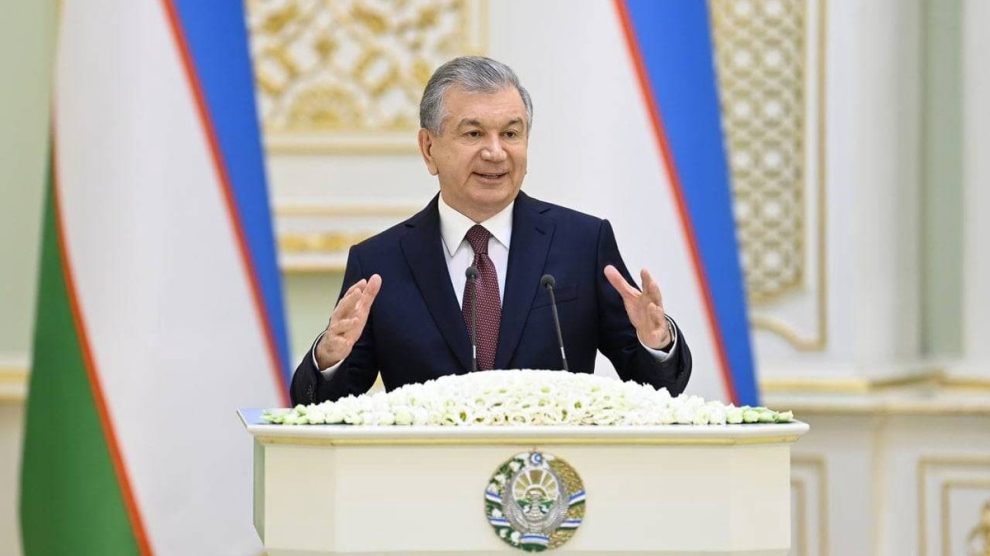On April 30, Uzbekistan’s voters overwhelmingly approved sweeping constitutional reforms that will allow the current president to serve for two additional seven-year terms. A snap presidential election scheduled for July will likely pave the way for the president to rule through 2037.
Since Shavkat Mirziyoyev took power following the death of his predecessor, Islam Karimov, in 2016, he has pursued liberal reforms and regional integration after decades of insularity and notorious human rights abuses.
Forced labour in the cotton industry has been eradicated, and judicial reforms to increase transparency allow Uzbeks to track court trials in real time online.
The economy is slowly being opened up to foreign investment, and international organisations welcomed. Last year the country hosted a major UNESCO conference on education, and last month the European Bank of Reconstruction and Development’s annual meeting.
Since his re-election in 2021, Mirziyoyev has pursued various constitutional reforms—some of which proved so controversial they incited an uprising in Uzbekistan’s autonomous republic of Karakalpakstan in July 2022.
- Uzbekistan grasps its chance to shine
- How Uzbekistan’s cotton industry cleaned up its act
- ‘A reality to be accepted’: Why Central Asia is increasing engagement with the Taliban
The most controversial change in the draft constitution was not changing the length of presidential terms from five years to seven, which would have allowed Mirziyoyev to serve two seven-year terms after the end of his second and final five-year term in 2026, but rather the elimination of Karakalpakstan’s constitutional right to hold a referendum on secession.
After large crowds protested in Karakalpakstan, Mirziyoyev withdrew the amendment in a bid to deescalate tensions, but clashes between demonstrators and security forces still resulted in deaths and critical injuries.
On March 10, Uzbekistan’s legislature approved a constitutional referendum to go ahead on April 30 on a set of 200 amendments including changing the length of presidential terms. The other amendments changed 64 of the existing 128 articles while adding other new articles.
These amendments guarantee the rights to a living wage, dignified working conditions, protection of personal data, housing, free healthcare, and education. The right to a healthy environment—and to compensation for damage to health and property from environmental violations—and labour rights to prohibit employment discrimination against pregnant women were also included.
Further amendments required the accessibility of services and facilities to people with disabilities and protections for defendants in cases. Capital punishment had already been banned by presidential decree, but the amendments included a constitutional ban as well.
A predictable result
In the weeks leading up to the referendum, celebrities, athletes, government officials, and business leaders attended concerts and other mass events to show support for the changes. Social media influencers were also enlisted to promote supportive hashtags.
According to data released by election officials, almost 85 per cent of eligible voters turned out to vote in the referendum. Over 90 per cent of those who voted approved the amendments.
“The 30 April constitutional referendum was technically well-prepared and widely promoted as intending to enhance various rights and freedoms,” said observers from the Organisation for Security and Co-operation in Europe (OSCE) in a preliminary statement on April 30.
“The consultation process on the draft amendments was overall comprehensive while lacking open debate on some contentious issues, and there was no organised opposition to the amendments. The referendum was introduced as a continuation of broader reforms implemented over the last years but took place in an environment short of genuine political pluralism and competition.”
The observers said that alternative views needed to be encouraged and further opportunities for independent civil society ought to be provided to nurture the development of a more pluralistic political sphere in the country.

Two decades of Mirziyoyev
Following the success of the referendum, Mirziyoyev announced on May 8 that he would move the next presidential election forward by more than three years to July 9.
Given that he has only served one full five-year term and part of a second, under the new constitution he will be eligible to serve for two full seven-year terms.
With little political competition to speak of, Mirziyoyev now seems set to remain in office until 2037.
Photo: Uzbek President Shavkat Mirzoyiyev via iiv.uz (CC BY 4.0).
Unlike many news and information platforms, Emerging Europe is free to read, and always will be. There is no paywall here. We are independent, not affiliated with nor representing any political party or business organisation. We want the very best for emerging Europe, nothing more, nothing less. Your support will help us continue to spread the word about this amazing region.
You can contribute here. Thank you.







Add Comment